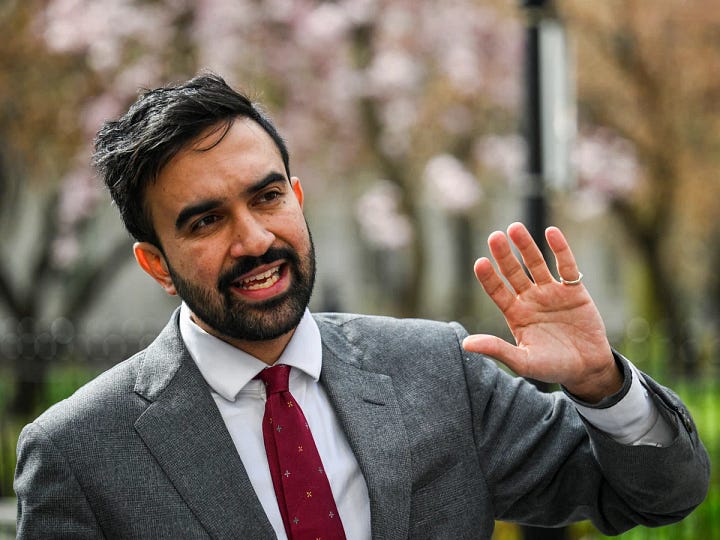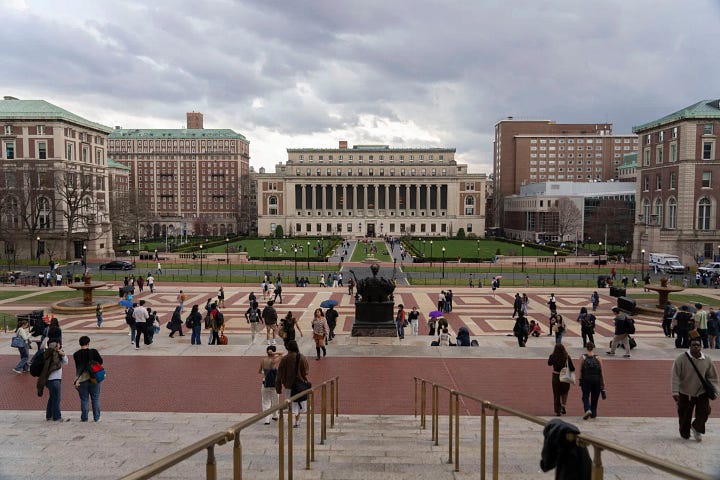What Makes Mamdani's College Admissions Story Newsworthy?
It's Not About Zohran, It's About The Hypocrisy And Disingenousness Of The Left


Republicans and right-leaning Democrats, left shellshocked by Assemblyman Zohran Mamdani’s surprise victory in last month’s Democratic Primary for New York City Mayor, have been doing what Andrew Cuomo failed to do for months: conduct opposition research.
Digging through Mamdani’s past on and off social media, some controversy has come to light in the last two weeks. Perhaps the most salacious is that Mamdani, in his application to Columbia University as a high school student, identified himself as “African-American.” The story, which The New York Times broke through leaked admissions files accessed by a right-wing hacker who was trying to prove colleges were still conducting illegal Affirmative Action policies, started a mini-firestorm. Mamdani did not get accepted to Columbia – despite his father being a professor there – and instead attended Bowdoin College in Maine.
I hesitated to write about this “scandal” because, frankly, I don’t think it’s going to be too damaging to Mamdani’s general election campaign. As the Democratic candidate, he remains a near lock to win, and most of the establishment appears to be resigned to him as the next mayor, even if they’re not openly embracing him.
However, both Mamdani supporters and opponents have raised the issue with me this weekend and repeatedly asked for my context and opinion. I was compelled to write something about it.
Why is it considered a scandal? Well, it’s less about Mamdani himself and more about the hypocrisy and disingenuousness of the progressive movement he is a part of when it comes to social justice and the minority group they’ve had a hard time breaking through with - Black Americans.
African-American, historically, is a label given to Black Americans who descend from slaves. Until recently, with the advent of DNA in ancestry, most Black Americans did not know where in Africa they descended from because their family history was erased when their ancestors were brought on slave ships. Recent black immigrants, who came to the United States as free people in the last century or so, can trace their lineage back to tribes or countries in Africa and often identify by the country or tribe they are from, such as Nigerian-American, Ghanaian-American, and Kenyan-American. Mamdani, though born in the African country of Uganda, is of Indian-American descent. His lineage comes from workers from India who were imported to Uganda as laborers in the mid-20th Century.
The controversy of who is “African-American” is not new. President Barack Obama faced similar questions. Since his African lineage is from his Kenyan-born father and not from slaves, many Black Americans did not consider him authentically “black.” However, First Lady Michelle Obama descends from South Carolina slaves, and that helped give some credibility to her husband, as did his time working as a community organizer in Chicago’s South Side, a neighborhood populated by descendants of slaves. Some of his experiences as a black man in America, told in his books, helped bridge that divide. It fundamentally did not seem to matter whether you were black and descended from slaves or black because your ancestors immigrated to the United States as free people after the Civil War, black Americans in the late 20th and early 20th centuries all faced the same experiences. Mamdani, however, is not physically black. He is South Asian.
That’s where the controversy comes in. Checking the “African-American” box is seen by some as an insult to the Black community, who have historically relied on race identifiers on college applications to help them get a leg up in higher education admissions to close the gaping racial education gap. The scandal here is that Mamdani used a technicality to, possibly, attempt to steal an opportunity that could’ve gone to a black person, all while preaching for social justice causes meant to lift those same Black Americans.
What the media finds spicy about the story is that it reinforces the negative stereotypes of urban elite leftism that undermine its credibility; that their advocacy for social and economic justice is phony and self-serving. The scandal reinforces the idea that when you strip away all the buzzwords and protest signs, leftists are no different than the people they claim to hate – willing to uphold and exploit systems if it serves them to do so, even while arguing those systems need to be dismantled.
To weather this, Mamdani should acknowledge his mistake, apologize for it, and make a promise to New York City’s black community to improve education opportunities, then refocus on his economic campaign. He’s mostly done that, but his supporters have instead fanned the flames, explaining and rationalizing in a way that only gives the controversy oxygen.
They’re resurrecting crazy arguments like one from Nikole Hannah-Jones from 2020 about how there’s a form of blackness that is “politically black,” suggesting that his “wokeness” and the fact that he’s endured similar prejudice as black people, it is not a problem for him to identify as African-American. Others have endorsed the idea that his African birth entitles him to the title, even while having rejected that argument for Elon Musk, who was also born on the African continent. Some black people have suggested that this kind of argument cheapens and makes a mockery of African-American culture and identity.
Now there is a larger discussion here to be had about what “African-American” means in 2025, when there is a significant population of immigrants from Africa who came to America as free people – something that wasn’t asd true when “African-American” started to gain salience 40-50 years ago in the waning days of the Civil Rights Movement. However, that is an academic discussion that will likely be over the heads of most New York City voters. For the time being, the “scandal” here is that Mamdani used a moniker that historically and culturally he is not entitled to. Plus, the complex terminology debate has only exacerbated the scandal in the media, to the delight of Mamdani’s opponents.
The scandal reinforces the idea that when you strip away all the buzzwords and protest signs, leftists are no different than the people they claim to hate – willing to uphold and exploit systems if it serves them to do so, even while arguing those systems need to be dismantled.
I think the reason the left is trying to rationalize it is not that they fear it will cost him an election, but that it will hurt his credibility and theirs at a time when they’re hoping to be on the rise nationally. They hope and expect Mamdani to become a national figure, the person they hoped Sen. Bernie Sanders and Rep. Alexandra Ocasio-Cortez would have become, who will lead a socialist renaissance and not only conquer the Democratic Party, but form a broad enough coalition to end this era of partisanship and culture divisiveness that has favored the far right.
They’re, of course, delusional. Even if that were possible – and I suppose anything is possible – that renaissance is not going to be led by the Muslim Mayor of New York City, who is the son of an academic and a Hollywood filmmaker. There is nothing about Mamdani that is relatable to the working class nationally.
Suppose progressives do have a socialist renaissance that threatens the national Democratic Party. In that case, it will be led by someone with a profile that is culturally aligned with the Trump-loving bourgeoisie: a veteran or a blue-collar white man who comes from or has a connection to a rural town, specifically one that has been battered by post-industrial decline. He – and it will have to be a man – might have the same politics as Mamdani, but he will have very different vibes and come from a very different cultural background.
Mamdani is running for the most thankless job in the United States. No mayor in recent history has had a successful national profile. There is no reason to suspect that Mamdani will be any different. At best, he will be like Boston Mayor Michelle Wu or Baltimore Mayor Brandon Scott, successful big-city progressive mayors who are largely overlooked by the national political scene, except for a decent speaking slot at the Democratic National Convention. At worst, he is like Chicago Mayor Brandon Johnson or Los Angeles Mayor Karen Bass, an albatross around the neck of the national Democratic Party they want to keep at arm’s length. There is no reason for Mamdani’s supporters to try to rationalize and justify this scandal. It’s probably not even the worst one he’ll face from New York City’s anti-leftist media ecosystem.





You can make a case that racial preferences for “under-represented minorities” (which everyone agrees does not apply to Mamdani) are important and necessary for a variety of reasons, ranging from representation in elite spaces or as a form of soft reparations. I have issues with some of that, but there is a theoretically coherent case. But if you believe that these policies are important, then you should defend them- and part of that defense is shame and social opprobrium for people who game and take advantage of these policies. Progressives who say that cases like this (and earlier ones, like Elizabeth Warren’s) should be waved away as unimportant are unwittingly strengthening a politics of cynicism that ultimately benefits conservatives.
Really bad take. There’s no evidence that Mamdani was trying to take someone’s space. He told his side of the story and I’ve seen nothing to refute it. He said his intent was to captive his rather unique heritage. You can question whether he should have done it and think it’s unfair for him to seem to claim something he’s not entitled to, but he didn’t get in to Columbia, so what’s the “scandal” here?